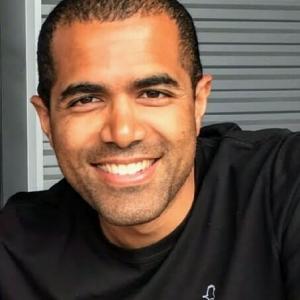Garrett-Evangelical Theological Seminary’s Rueben P. Job Institute for Spiritual Formation and the American Association for the Advancement of Science (AAAS) Dialogue on Science, Ethics and Religion (DoSER) will host a one-day conference titled, “Science is Not Enough to Save Us: Recentering our Knowledge Systems in a Relational Cosmos.” Dr. Philip Kurian, Principal Investigator and Founding Director of Quantum Biology Laboratory at Howard University, will serve as the keynote speaker. In addition, two roundtable conversations with Garrett’s doctor of philosophy students will be held.
This conference is open to the entire Seminary community, the general public, and partners.


Philip Kurian is a theoretical physicist, (re)search(ing) scientist, and essayist, serving as principal investigator and founding director of the Quantum Biology Laboratory (https://quantumbiolab.com) at Howard University and visiting research professor at the University of Iowa. Beginning his career as a math teacher in North Philadelphia, Dr. Kurian is now the recipient of fellowships, grants, and awards from the U.S.-Italy Fulbright Commission, Argonne and Oak Ridge Leadership Computing Facilities, Whole Genome Science Foundation, National Science Foundation, and the National Institutes of Health.

Philip Kurian is a theoretical physicist, (re)search(ing) scientist, and essayist, serving as principal investigator and founding director of the Quantum Biology Laboratory (https://quantumbiolab.com) at Howard University and visiting research professor at the University of Iowa. Beginning his career as a math teacher in North Philadelphia, Dr. Kurian is now the recipient of fellowships, grants, and awards from the U.S.-Italy Fulbright Commission, Argonne and Oak Ridge Leadership Computing Facilities, Whole Genome Science Foundation, National Science Foundation, and the National Institutes of Health. His laboratory studies how collective and cooperative quantum behaviors can explain biological phenomena at the mesoscopic, organismal, and clinical scales, including in neurodegeneration, cancer, and human consciousness.
In 2020 the Quantum Biology Laboratory became the first group in the U.S. and third in the world to receive a scientific grant from the Guy Foundation, and the lab’s expertise is solicited regularly by federal agencies, national academies, and private foundations. In 2021 Dr. Kurian was appointed as a lead expert and organizer for the National Academies of Sciences, Engineering, and Medicine workshop on quantum-enabled sensing and imaging for biology. In 2022 he became a senior fellow at the UCLA Institute for Pure and Applied Mathematics, developing advanced theory and methods to understand complex, open, and nonequilibrium quantum systems. Dr. Kurian also serves as a scientific advisor to the “Science for Seminaries” program of the AAAS Dialogue on Science, Ethics, and Religion, which seeks to integrate frontier science questions into conversations among future theologians and clergy. His essays on human knowledge systems, empire, and spirituality have appeared in various media outlets, including the Los Angeles Review of Books, Granta, and Plough.
Our collective representations of the physical world—what we consider “real” about nature, whether a tree, rainbow, or electron—are determined by the observational capacities of measuring subjectives. We will delve into the dualities between subjectivity and objectivity, spiritual and physical, mind and matter, and potentia and manifestation, examining Aristotle, Augustine, Aquinas, and the usual suspects but also engaging Kierkegaard, Buber, and Ngũgĩ wa Thiong’o in the search for a coherent and global description of reality. The question asked by Pilate (What is Truth?) becomes the framework for understanding how a community of subjectives—whose terms of observation are not universal, but merely agreed upon—constitutes a network that constructs a body of knowledge through hypothesis, testing, and paradigm shift. Cumulative knowledge, of course, does not trump or circumvent the need for advancement of individual awareness. Measurements are defined as (co-)relations, and a relational interpretation of quantum physics privileges the observational capacity of the individual subjective and relinquishes the demand for universal objectivity. When limited observations are treated as universal, the sensory augmentation offered by modern science actually flattens the mystery and capaciousness of Truth, restricting our apprehension of reality and human flourishing. The inflated claims of Big Science and Big Religion will be shown to promote serious dangers for acolytes of the spirit and “priests of nature” alike.
Roundtable Conversation on “Race, Trauma, and Technology”
Keynote lecture featuring Dr. Philip Kurian
Response by Dr. Wonhee Anne Joh
Keynote lecture featuring Dr. Philip Kurian
Response by Dr. Dong Hyeon Jeong
Continued Roundtable Conversation Centered on “Race, Trauma, and Technology”
In September 2021, Garrett was awarded a Science for Seminaries Seed Grant from the AAAS Dialogue on Science, Ethics, and Religion program. The grant has helped fund the “Race, Technology, and Healing: Science and Religion in Dialogue” project led by Dr. Rolf Nolasco, Jr. and Dr. Wonhee Anne Joh.